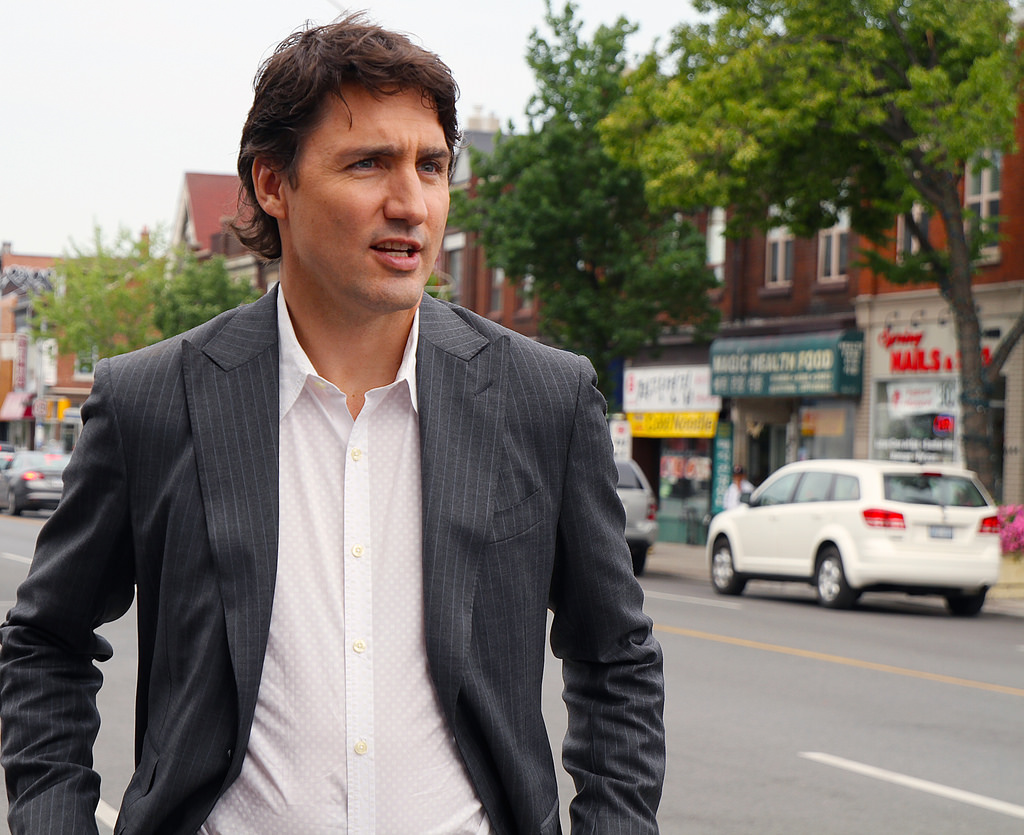
Photos by Alex Guibord / Flickr
Justin Trudeau and the Liberal Party stormed to power in Canada in a surprise win over Conservative Prime Minister Stephen Harper, officially taking office today. For Canadian students studying abroad, Trudeau’s victory elicited hope and questions about his competency as he ended a decade of Conservative rule.
This election, the Liberal Party was particularly adept at drawing in new voters and voters in the 18-29 age demographic. Trudeau, the second youngest Prime Minister in Canada’s history, achieved a sort of cult status both in Canada and abroad for his good looks and youthful side. He hikes, did an interview with Vice, takes selfies and has a tattoo of a raven on his bicep.
The decisive Liberal victory brought the party 47 percent more seats in Parliament and ended nearly a decade of Conservative government. Toronto resident and Weinberg senior Bundi Okwuosa believes Trudeau’s appeal and Harper’s multiple terms made young Canadians restless for a more vibrant candidate.
“When someone’s been in power for so long, people want things done differently,” Okwuosa said. “Trudeau’s so much more accessible and interesting to younger people.”
In an electorate with 2.8 million more voters than ever before, the Conservatives lost 230,000 votes – a significant chunk. McCormick senior and Conservative Party supporter Ross Laird laments the Conservative Party’s lack of connection to young voters as one of the key reasons behind their defeat.
“The Liberals were much more effective at reaching out to the 18-25 demographic on social media, college campuses and at getting them to come out and vote,” Laird said. “Their values also align much more with that demographic.”
Expanded advance polls and a concerted push by Elections Canada, the federal agency that oversees elections, played a major role in getting youth to the polls. Overall voting was up 7 percent, with youth poised to be a significant part of that number, according to Elections Canada. While that has a powerful impact on young Canadians living in Canada, it’s not so simple for Canadians abroad who have to mail in their ballots. Okwuosa and Laird didn’t vote this year, citing convenience and identifying with the political majority as deterrents.
The Liberals were effective at targeting issues important to young voters, particularly youth unemployment and marijuana legalization. Weinberg sophomore and Toronto native Elodie Oliver believes marijuana legalization might have been the tipping point for young voters trying to decide how to vote for the first time.
“I think their social media and honestly their stance on marijuana were a big pull for the youth,” Oliver said. “My friends and other people my age paid a lot of attention to their legalization policies.”
With Trudeau’s youth also comes concern regarding inexperience. The son of late Prime Minister Pierre Trudeau, Justin Trudeau’s rise to office has had its critics. The younger Trudeau has been in office for seven years, and the leader of the Liberal party for two. While he is a popular political figure who has shown excellent strategic ability during this campaign, his leadership ability at the most important office in Canada remains to be seen.
“Trudeau is definitely a viable and smart candidate, but I’m not sure how much of that comes from his dad’s legacy,” said Okwuosa. “I feel like he needs to prove himself fit for the job.”
The shift from Conservative to Liberal government may reflect changing Canadian values. Harper’s tough stance on crime, inaction on the refugee crisis and recent laws aimed overtly at Muslim Canadians may partly explain the loss of 230,000 votes.
“Harper alienated a whole segment of the population with his anti-Muslim policies,” said Oliver. “I think Canada needed something different, and we got it.”